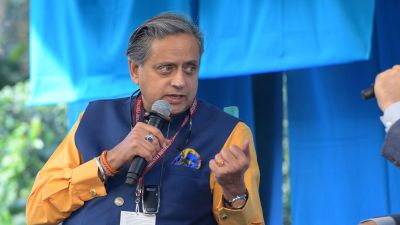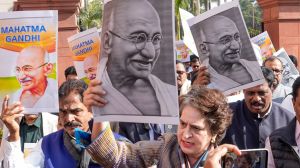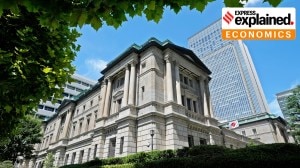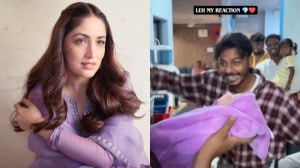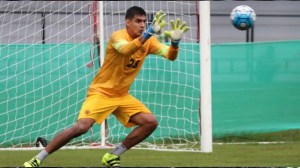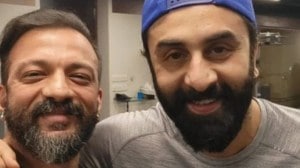Meet the 26: Where the Opposition parties meeting in Bengaluru stand
A total of 26 opposition parties set the tone for their 2024 Lok Sabha campaign by forming a coalition --Indian National Developmental Inclusive Alliance -- to take on the ruling NDA in 2024 polls
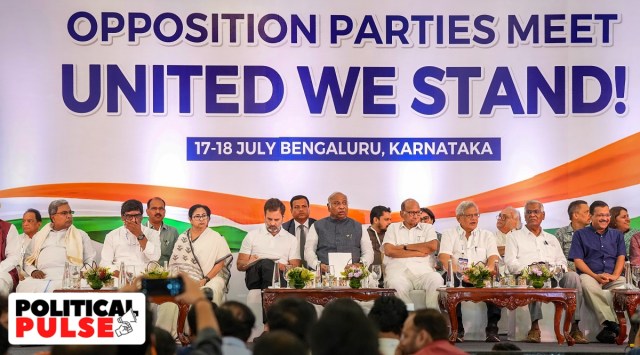 Congress President Mallikarjun Kharge, party leader Rahul Gandhi, West Bengal CM Mamata Banerjee, Delhi CM Arvind Kejriwal, NCP supremo Sharad Pawar and others at a press conference after the opposition parties' meeting, in Bengaluru, Tuesday, July 18, 2023. (PTI Photo)
Congress President Mallikarjun Kharge, party leader Rahul Gandhi, West Bengal CM Mamata Banerjee, Delhi CM Arvind Kejriwal, NCP supremo Sharad Pawar and others at a press conference after the opposition parties' meeting, in Bengaluru, Tuesday, July 18, 2023. (PTI Photo) Setting the tone for their 2024 Lok Sabha campaign, a total of 26 opposition parties on Tuesday formed a coalition –Indian National Developmental Inclusive Alliance (INDIA)– to take on the ruling NDA led by the Bharatiya Janata Party.
With the parties wrapping up their two-day conclave in Bengaluru, we take a quick look at the present status of these parties in states.
1. Indian National Congress
The Congress is the largest party in the Opposition bloc and has 49 MPs in Lok Sabha and 31 in Rajya Sabha. It is currently in power in four states — Karnataka, Rajasthan, Chhattisgarh and Himachal Pradesh — and is part of the ruling dispensations in Bihar, Tamil Nadu and Jharkhand.
On the second day of the Opposition meet, Congress President Mallikarjun Kharge said that the party is “not interested in power or post of prime minister”.
“Our intention is not to gain power for ourselves, it is to protect Constitution, democracy, secularism, social justice,” he added.
2. All India Trinamool Congress (TMC)
Led by Mamata Banerjee, the party is in power in West Bengal and has 23 MPs in Lok Sabha and 12 MPs in Rajya Sabha. It also has legislators in a few other states, including Meghalaya.
The TMC has given signals in the past that it intends to not just contest all the seats in Bengal but is hoping to make its presence felt in some other states, hoping to emerge as a force at the national level.
3. Dravida Munnetra Kazhagam (DMK)
Led by Tamil Nadu Chief Minister M K Stalin, DMK is in power in Tamil Nadu and has influence in Puducherry. It has 34 MPs (24 in the Lok Sabha and 10 in the Rajya Sabha).
He had dubbed the previous opposition meet in Patna as a war cry against a “fascist and autocratic” regime.
4. Aam Aadmi Party (AAP)
The Arvind Kejriwal-led party is in power in Delhi and Punjab and has 11 MPs (one in Lok Sabha and 10 in Rajya Sabha).
Support towards opposing the Centre’s ordinance had become a bone of contention between the Congress and AAP with the latter stating after the first Opposition meeting that it would be very difficult for it to be part of a coalition until the grand old party publicly denounced the central government’s move. Which the Congress did, a day before the Bengaluru meet.
5. Janata Dal (United)
Led by Bihar Chief Minister Nitish Kumar, who hosted the first opposition meeting in Patna, the party officially has 21 MPs (16 Lok Sabha and five Rajya Sabha).
Nitish Kumar snapped ties with the BJP last year and joined hands with the RJD and the Congress. He has emerged as a key factor in the Mission Opposition unity as he has succeeded in breaking the ice between the Congress and some of the key regional players like Mamata and Kejriwal, with whom the grand old party’s relations had been strained.
6. Rashtriya Janata Dal (RJD)
The party led by Lalu Prasad is part of the government in Bihar with his son Tejashwi Yadav as the deputy chief minister. It has six MPs — all in Rajya Sabha.
Lalu, Tejashwi and Rabri Devi were recently named in a CBI chargesheet in the alleged land-for-job scam in Bihar. Responding to the allegations Tejashwi has said that there was “no merit” in the case and accused the BJP of political vendetta.
7. Jharkhand Mukti Morcha (JMM)
The party of Jharkhand Chief Minister Hemant Soren leads a coalition government in the state. It has three MPs (one in Lok Sabha and two in Rajya Sabha).
8. Nationalist Congress Party (NCP) –
Founded by Sharad Pawar, NCP has suffered a vertical split since the meeting of opposition parties in Patna. His nephew, Ajit Pawar was sworn in as Deputy Chief Minister of Maharashtra on July 2 as he joined the BJP-Shiv Sena (Shinde) government.
Meanwhile, Sharad Pawar faction is currently part of the opposition in the state along with Congress and Shiv Sena (UBT).
9. Shiv Sena (UBT)
As the Shiv Sena founded by Bal Thackeray split in June last year, due to a rebellion led by Eknath Shinde, the faction led by Uddhav Thackeray came to be known as Shiv Sena (UBT).
After joining hands with the BJP, Shinde became the Chief Minister of the state and received the recognition of the real ‘Shiv Sena’ for his faction from the election commission.
10. Samajwadi Party (SP)
The Samajwadi Party, led by former chief minister Akhilesh Yadav, is the main opposition party in Uttar Pradesh, a state which sends the maximum number of members to Lok Sabha. SP currently has three Lok Sabha and three Rajya Sabha MPs.
11. Rashtriya Lok Dal (RLD)
RLD was formed in 1996 by Ajit Singh, who is the grandson of former prime minister Charan Singh. The party is currently led by Ajit’s son Jayant Singh who is it’s sole MP in the Rajya Sabha. The party primarily derives its support from western Uttar Pradesh.
12. Apna Dal (Kamerawadi)
Apna Dal, formed by Sonelal Patel in 1995, is a political party mainly active in Uttar Pradesh and finds its base in the Kurmi community. The party is currently helmed by Patel’s wife Krishna Patel and daughter Pallavi Patel.
While the Kamerawadi faction is aligned with the Samajwadi Party, Apna Dal (Sonelal) led by Patel’s other daughter Anupriya has been an ally of the ruling BJP for several years.
13. Jammu and Kashmir National Conference (NC)
Led by former chief minister Farooq Abdullah, National Conference is among the key forces in Jammu and Kashmir.
His son and former CM of J&K state Omar Abdullah alleged that the Constitution has been eroded and the country’s secular fabric undermined during the rule of the Modi government at the Centre.
“It is important that we put up a united stand against everything going wrong,” he said at the Bengaluru meet.
The party currently has three Lok Sabha members.
14. Peoples Democratic Party (PDP)
Another key player in Jammu and Kashmir politics, PDP is led by former chief minister Mehbooba Mufti. Alleging that the country’s constitution and democracy were being “played with”, she said that all sensible parties need to come together and unite to save the idea of India.
PDP currently does not have any representation in Lok Sabha.
15. Communist Party of India (Marxist)
The CPI(M), the principal party in the Left bloc, leads the LDF government in Kerala. Active in West Bengal, Tripura and Tamil Nadu, it has eight MPs (three in Lok Sabha and five in Rajya Sabha).
In competition with the TMC in West Bengal, party general secretary Sitaram Yechury has ruled out any alliance with the TMC, adding that secular parties along with the Left and the Congress will take on the BJP as well as the TMC in the state. He said at the Centre what form this will take will be decided later.
16. Communist Party of India (CPI)
The CPI is part of the ruling LDF in Kerala. It has two Lok Sabha members and two Rajya Sabha members. Recently, the Election Commission withdrew its status as a state party in West Bengal and Odisha, while it remains a state party in Kerala, Manipur and Tamil Nadu.
17. Communist Party of India (Marxist-Leninist) Liberation
A break away faction of the CPI, the CPI-ML (Liberation) is part of the ruling coalition in Bihar. Headed by Dipankar Bhattacharya, the party has 12 MLAs in the state.
18. Revolutionary Socialist Party (RSP)
A part of the Left bloc, RSP was founded by Tridib Chaudhuri and has its roots in the Bengali liberation movement Anushilan Samiti and the Hindustan Socialist Republican Army.
RSP has one Lok Sabha member, from Kerala. It has some support base in states including West Bengal and Tripura.
19. All India Forward Bloc
Founded by Netaji Subhas Chandra Bose in 1939, initially it emerged as a faction within the Congress Party. The party had established its electoral presence post-Independence in states such as Tamil Nadu, Andhra Pradesh, Kerala and Assam, with West Bengal being its main stronghold, but eight decades down the line, the party, now limited to just some pockets of the country, has no MP or MLA in its kitty.
20. Marumalarchi Dravida Munnetra Kazhagam (MDMK)
The MDMK, led by Rajya Sabha MP Vaiko, was formed in 1994. It is a part of the DMK-led coalition in Tamil Nadu and has a support base in both Tamil Nadu and Puducherry.
21. Viduthalai Chiruthaigal Katchi (VCK)
VCK or The Liberation Panthers Party is led by Thol. Thirumaavalavan and is a part of the DMK-led alliance in Tamil Nadu.
Dalit Panthers Iyakkam movement began as anti-caste movement in 1982 under the leadership of M. Malalchami in Madurai. After his death in 1989, Thol. Thirumaavalavan took over and renamed it as VCK
After boycotting electoral politics for a decade, they finally decided to contest polls in 1999 and since then have allied with DMK, AIDAMK and the Pattali Makkal Katchi (PMK),
Currently, Thirumaavalavan is the only Lok Sabha MP.
22. Kongunadu Makkal Desia Katchi (KMDK)
The KMDK, led by businessman-turned-politician E R Eswaran, is part of the DMK-led alliance in Tamil Nadu. It enjoys some support in western Tamil Nadu. The party has a member in Lok Sabha – A K P Chinraj – but he won on the DMK symbol.
23. Manithaneya Makkal Katchi (MMK)
The MMK led by M H Jawahirullah was formed in the year 2009. It is part of the DMK-led alliance in Tamil Nadu. Jawahirullah is currently an MLA and also serves as a member of the All India Muslim Personal Law Board (AIMPLB).
24. Indian Union Muslim League (IUML)
The IUML was founded by M. Muhammad Ismail is recognised as the state party in Kerala. The Congress and IUML are long standing partners in the United Democratic Front (UDF), one of the two major political alliances in Kerala.
The party is strongest in Kerala and also has a unit in Tamil Nadu as well. It has three members in the current (17th) Lok Sabha — ET Mohammed Basheer, M P Abdussamad Samadani and K Navas Kani — and one member, P V Abdul Wahab, in Rajya Sabha. The party has 15 member is the Kerala state assembly.
25. Kerala Congress (M)
The party was formed by K. M. Mani in 1979 and is now led by his son Jose M Mani. The party has one Lok Sabha and one Rajya Sabha member. It contested the 2021 assembly polls in the state as part of the CPI(M)-led LDF.
26. Kerala Congress (Joseph)
Based in Kerala, the party is currently led by P.J. Joseph. It was part of the Congress-led UDF, which is the main challenger to the CPI(M)-led LDF in the Kerala in the last Assembly polls.
- 01
- 02
- 03
- 04
- 05


